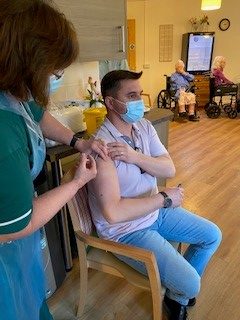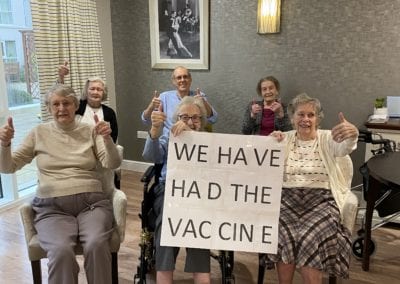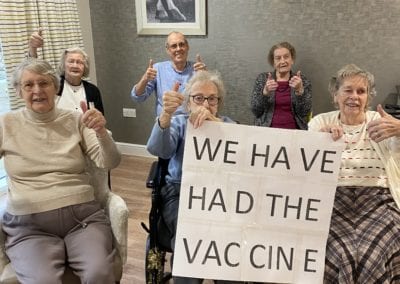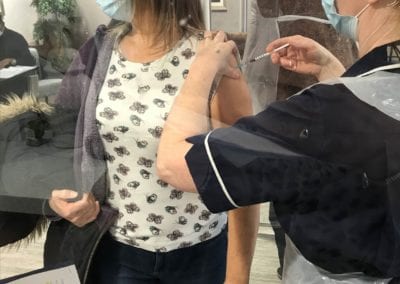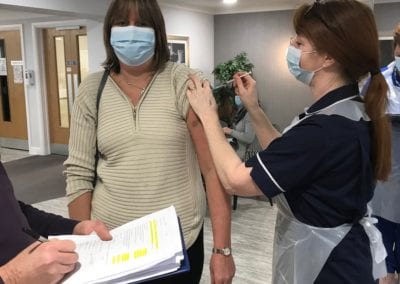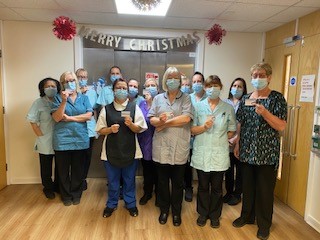COVID-19 (Coronavirus) Vaccinations
Information and research page for Glenholme staffAs you will be aware, the vaccination rollout is now taking place across the UK with over 61 million vaccinations give as of 26th May 2021. This is a cause for celebration across the country and carries particular significance for the vulnerable and those of us who support them. Vaccination remains the only way to protect our service users from the threat of Covid-19 and for this reason, Glenholme expects all staff to be vaccinated.
We understand that you may have questions about the vaccine. This page contains a range of information to help answer these. If you do decide to do your own research on the topic, please remember these 3 important things:
-
Anyone can make a website and put anything online regardless of if its factual
-
Social Media is not a credible source of information
-
Fake news spreads 4 times faster than legitimate news so always check the source
- Vaccination Information from the NHS
- Information for Healthcare Professionals on Pfizer/BioNTech COVID-19 vaccine
- I’m pregnant. Should I get the COVID vaccine?
- Information for UK recipients on COVID 19 Vaccine AstraZeneca
- What is the Oxford-AstraZeneca vaccine?
- COVID-19 Vaccine AstraZeneca Official Page
- Information for the recipients of COVID-19 Vaccine AstraZeneca solution for injection
- Safety and Efficacy of the Pfizer vaccine
- Safety and efficacy of the Oxford vaccine
- Information for Healthcare Professionals on Pfizer/BioNTech COVID-19 vaccine
- Covid-19 vaccination: What’s the evidence for extending the dosing interval?
- Maternal and perinatal outcomes of pregnant women with SARS-CoV-2 infection at the time of birth in England: national cohort study
- David Pearson, Dr Nikita Kanani and Professor Jonathan Van Tam answer questions about the vaccine for the care sector
- Vaccines 101: How new vaccines are developed
- Inside the Lab That Invented the COVID-19 Vaccine
- Detailed Vaccine Information Webinar with Dr. Manon Ragonnet-Cronin, Imperial College COVID-19 Response Team
Side Effects of the Vaccine vs. Symptoms of COVID-19
You are understandably wary of potential side effects of any vaccination which may be why you are here. In this section, we’ll briefly explain the side effects of the vaccines but also quickly remind you of the symptoms of COVID-19 as well. After weighing the benefits and the risks, we hope you’ll see why taking preventative measures is much more preferable than having the disease itself.
Symptoms of COVID-19
Main symptoms (source)
The main symptoms of coronavirus are:
- a high temperature – this means you feel hot to touch on your chest or back (you do not need to measure your temperature)
- a new, continuous cough – this means coughing a lot for more than an hour, or 3 or more coughing episodes in 24 hours (if you usually have a cough, it may be worse than usual)
- a loss or change to your sense of smell or taste – this means you’ve noticed you cannot smell or taste anything, or things smell or taste different to normal
Most people with coronavirus have at least 1 of these symptoms.
Long-term effects of coronavirus (long COVID)
For some people, coronavirus (COVID-19) can cause symptoms that last weeks or months after the infection has gone. This is sometimes called post-COVID-19 syndrome or “long COVID”.
About long COVID
How long it takes to recover from coronavirus is different for everybody. Many people feel better in a few days or weeks and most will make a full recovery within 12 weeks. But for some people, symptoms can last longer. The chances of having long-term symptoms does not seem to be linked to how ill you are when you first get coronavirus. People who had mild symptoms at first can still have long-term problems.
Symptoms of long COVID
There are lots of symptoms you can have after a coronavirus infection.
Common long COVID symptoms include:
- extreme tiredness (fatigue)
- shortness of breath
- chest pain or tightness
- problems with memory and concentration (“brain fog”)
- difficulty sleeping (insomnia)
- heart palpitations
- dizziness
- pins and needles
- joint pain
- depression and anxiety
- tinnitus, earaches
- feeling sick, diarrhoea, stomach aches, loss of appetite
- a high temperature, cough, headaches, sore throat, changes to sense of smell or taste
- rashes
Normal vaccination reactions
It is normal to have certain reactions after a vaccination: there may be redness, swelling or pain around the injection site. Fatigue, fever, headache and aching limbs are also not uncommon in the first three days after vaccination.
These normal vaccine reactions are usually mild and subside after a few days. They show that the vaccine is working, because it stimulates the immune system and the body forms antibodies against the infection that is only “feigned” by the vaccination.
Accordingly, such typical vaccination reactions have also been reported after receiving the BioNTech-Pfizer, Moderna, AstraZeneca and the Russian Sputnik V vaccines, which are already in use.
Rarely serious side effects
In addition to the typical vaccination reactions, there were also individual cases of sometimes severe side effects after vaccination, such as allergic shocks, which were reported in detail. But these are isolated cases.
Overall, the approved vaccines are safe, according to the Medicines and Healthcare products Regulatory Agency (UK), the European Medicines Agency (EMA), the US Food and Drug Administration (FDA) and the World Health Organization (WHO), otherwise they would not have approved the vaccines.
Some of the new vaccines — so-called mRNA vaccines — are different from the established vaccines: they do not contain weakened or killed viruses. Instead they contain only a blueprint for a component of the COVID-19 pathogen.
Others are so-called vector vaccines that use harmless adenoviruses (such as cold viruses that only affect chimpanzees) as transporters to introduce the surface protein of SARS-CoV-2, the spike protein, and thereby trigger the immune response.
Frequently Asked Questions
Who can get the COVID-19 vaccine?
The NHS is currently offering the COVID-19 vaccine to people most at risk from coronavirus.
It’s being given to:
- people aged 80 and over
- people who live or work in care homes
- health and social care workers at high risk
Can I get the vaccine if I’m pregnant or breastfeeding?
There’s no evidence the COVID-19 vaccine is unsafe if you’re pregnant. But more evidence is needed before you can be routinely offered the vaccine.
The JCVI has updated its advice to recommend you may be able to have the vaccine if you’re pregnant and:
- at high risk of getting coronavirus because of where you work
- have a health condition that means you’re at high risk of serious complications of coronavirus
You can have the COVID-19 vaccine if you’re breastfeeding.
Speak to a healthcare professional before you have the vaccination. They will discuss the benefits and risks of the COVID-19 vaccine with you.
You do not need to avoid pregnancy after vaccination. The vaccine cannot give you or your baby COVID-19.
Does the COVID-19 vaccine affect fertility?
One of the most frequently asked questions from care workers is whether the vaccine affects fertility. There is no evidence of this. The British Fertility Society has produced this resource to provide helpful information to share with your colleagues for their peace of mind.
Meanwhile, further reassurance is provided in this joint statement from the Royal Colleges of Midwives, Obstetrics and Gynaecology. See also videos from NHS GP Dr Charles Esene and Public Health England’s Dr Gayatri Amirthalingam.
Click here to access the COVID-19 Vaccine Programme Communications Toolkit to Support Vaccine Uptake in Adult Social Care
How is the COVID-19 vaccine is given?
The COVID-19 vaccine is given as an injection into your upper arm.
It’s given as 2 doses. You will have the 2nd dose 3 to 12 weeks after having the 1st dose.
How do I get the COVID-19 vaccine?
If you’ve been sent a letter you can book your vaccination appointments online.
How safe is the COVID-19 vaccine?
The vaccines approved for use in the UK have met strict standards of safety, quality and effectiveness set out by the independent Medicines and Healthcare products Regulatory Agency (MHRA).
Any coronavirus vaccine that is approved must go through all the clinical trials and safety checks all other licensed medicines go through. The MHRA follows international standards of safety.
Other vaccines are being developed. They will only be available on the NHS once they have been thoroughly tested to make sure they are safe and effective.
So far, thousands of people have been given a COVID-19 vaccine and reports of serious side effects, such as allergic reactions, have been very rare. No long-term complications have been reported.
To find out more about the vaccines approved in the UK, see:
- GOV.UK: Pfizer/BioNTech vaccine for COVID-19 approved by MHRA
- GOV.UK: Oxford/AstraZeneca vaccine for COVID-19 approved by MHRA
- GOV.UK: Moderna vaccine for COVID-19 approved by MHRA
How effective is the COVID-19 vaccine?
The 1st dose of the COVID-19 vaccine should give you good protection from coronavirus. But you need to have the 2 doses of the vaccine to give you longer-lasting protection. After the vaccination, it takes roughly 3 weeks to develop immunity but this can vary from person to person.
Do I still need to wear PPE after having the vaccine?
There is a chance you might still get or spread coronavirus even if you have the vaccine.
This means it is important to:
- continue to follow social distancing guidance
- wear your facemask that covers your nose and mouth in places where it’s hard to stay away from other people
- continue to wear your normal PPE including mask, gloves and apron at work, until instructed otherwise
What are the COVID-19 vaccine side effects?
Most side effects of the COVID-19 vaccine are mild and should not last longer than a week, such as:
- a sore arm where the needle went in
- feeling tired
- a headache
- feeling achy
- feeling or being sick
You can take painkillers, such as paracetamol, if you need to.
If you have a high temperature you may have coronavirus or another infection.
If your symptoms get worse or you are worried, call 111.
Do the COVID-19 vaccine ingredients contain any animal products?
The 2 approved COVID-19 vaccines do not contain any animal products or egg.

